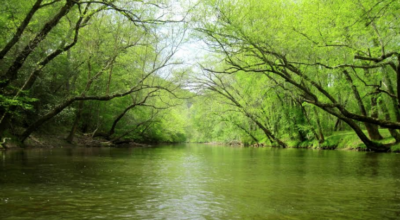Spirit of Rowan: A river runs through us: How the Yadkin Riverkeeper is committed to helping a state benchmark
Published 12:00 am Sunday, March 24, 2024
ROWAN COUNTY — It’s almost too easy to take water for granted. Even though water covers over 70 percent of Earth’s surface, only 1 percent of it is actually drinkable. Helping supply more than 841,000 people with fresh water is the Yadkin River, a 200-mile river that weaves through Winston-Salem, Lexington and Salisbury before it turns into the Pee Dee River at Lake Tillery.
Even though the Yadkin River is an essential asset for North Carolina, it faces a motley crew of obstacles. Water pollution from wastewater treatment plants and land development near the river hinder its natural beauty and prevent people from enjoying it recreationally and as a resource.
To better protect the Yadkin River and educate the public on what they can do to help, the Yadkin Riverkeeper, a non-profit organization from Winston-Salem, has spearheaded the fight to raise awareness of the river’s importance since 2008.
“Our mission is to protect and enhance the Yadkin River both in terms of the water quality and also recreationally use of the river and the lakes,” Yadkin Riverkeeper Executive Director Edgar Miller said.
Miller has participated in environmental policy and advocacy for 40 years, but even with decades of experience, he still has to overcome some harsh realities to accomplish his goals.
“It’s a challenge,” Miller said. “The river has some pollution problems. High Rock Lake is currently considered impaired for pollutants by the state, and that impacts ultimately recreational use, particularly if we see algae bloom.
“Our hope is that we are educating and making people aware of potential threats to the river, the importance of the river to the region’s economy and the environment.”
Much of the main pollution sources originate from overdevelopment, agriculture runoff, municipal wastewater and sewer overflow. Miller estimated that the developed area in the watershed is said to “basically double” by 2060, and local and state agencies “are way overtaxed and overwhelmed” to properly enforce regulations.
“I’ve seen a lot of communities step up since I’ve been in this job to stop development and other projects that could impair water quality. I think we’re getting there, but right now, we’re in such an uptick with the development that it’s hard to keep up,” Miller said.
Joe Morris was the immediate past president of the Yadkin Riverkeeper and also served as the director of city planning for Salisbury as well as a board member of Three Rivers Land Trust. Morris said the organization needs to increase its membership, but its financial situation has greatly improved thanks to large donations. Morris feels as though regular citizens are starting to become more aware of environmental issues that happen at a national and local level, such as localized flooding. He just believes what’s being done from a government standpoint isn’t enough for what the Yadkin River is dealing with.
“I am concerned about the regulatory environment,” Morris said. “We don’t have the support in the general assembly that we once did for environmental issues. I’m concerned about how some regulations might be relaxed that could have a negative impact on the river.”
One of the major priorities for the Yadkin Riverkeeper is the High Rock Lake Nutrient Management Strategy, which is focused on protecting river buffers, reducing phosphorus and nitrogen, and having better stormwater control in the lake.
In addition, the Yadkin Riverkeeper is hoping to improve the Yadkin State River Trail and restore the watershed on the South Yadkin River.
Some of the things people can do to help the river is reduce fertilizer use, clear less land, join the Yadkin Riverkeeper, and make sure elected officials are not agreeing to overdevelopment.
“I’m very optimistic about the river, but I don’t want to sound naive because I know there’s development pressure, we have a growing population in this state, we’re going to have more industrial agriculture, more animals. We need more protein for people,” Morris said.
As executive director, Miller is realistic on where things currently stand with the Yadkin Riverkeeper. Still, when taking into account all of the work they have done in the past 16 years, he’s ready for what the future holds.
“We are at a critical juncture that we have the opportunity to do right by the river and by High Rock Lake and the other lakes. I think bringing in community support, these new regulations that we clean up the river and the lake. There’s still hope we can do that. I’m optimistic in that regard. I’m also very aware of the challenges we face,” Miller said. “If we don’t take steps now, we will end up with a lake that can’t be used for drinking or swimming and not good for the fish either.”




